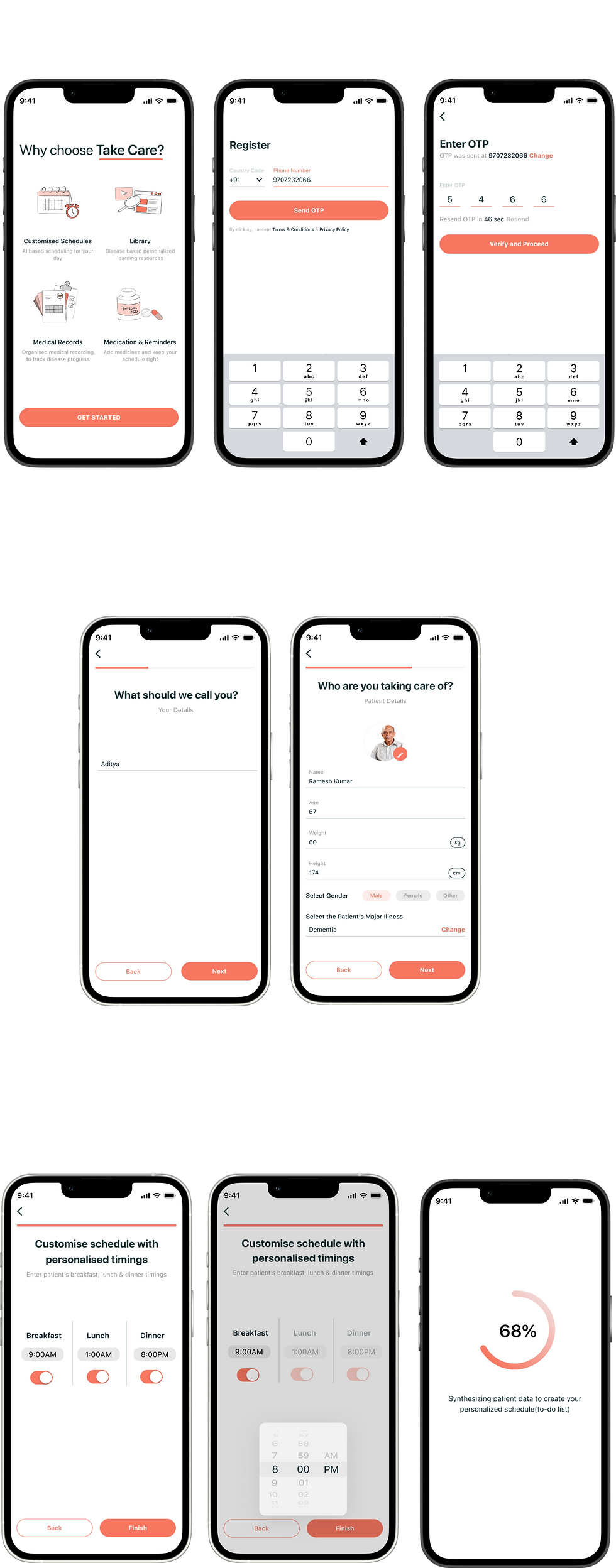
Take care: Helping you take care of your loved ones
This project aims to create a user-friendly app that simplifies caregiving by helping caregivers manage routines, stay informed about diseases, and track medical records. The app supports caregivers in providing better care while maintaining their own well-being.
Team
Smriti, Ritika, Meghna, Rohit
Duration
3 weeks
Brief
The intention was to replace the existing on-premise product that Agility was using internally and make it cloud-based,
Introduction
Caring for a loved one can be overwhelming, but with the right tools, caregivers can provide better support while maintaining their own well-being. Our app is designed to empower caregivers with everything they need to manage daily routines, stay informed, and keep track of essential medical records.
The app helps caregivers establish routines that prioritize both their loved ones and themselves, ensuring a healthy balance. It also offers educational guides tailored to specific diseases, helping caregivers better understand their loved ones' conditions and provide more informed care. Additionally, the app simplifies medical record-keeping, allowing caregivers to monitor treatments, medications, and appointments in one place.
Challenges
-
Caregivers balance loved ones' needs with their own well-being.
-
Tasks include routines, appointments, medication, chores, and emotional support.
-
Caregiving demands can lead to burnout, stress, and lack of personal time.
-
Challenges include medical literacy, financial management, and long-term care planning.
-
Informal caregivers often lack resources and community support.
-
Many feel isolated, unprepared, and emotionally drained.
-
Without proper tools, caregivers may struggle to maintain their health and care quality.
Solution

What does the application do?
Designing a companion,
That helps caregivers by providing them with AI based scheduling & personalised resources.
Additionally, there is a digital record keeping system.
The app provides personalized scheduling tools to streamline daily routines, manage medication reminders, and track medical appointments with ease.
It includes educational guides tailored to specific health conditions, helping caregivers stay informed and confident in their care.
Additionally, the app simplifies medical record management, organizing important documents in one accessible, secure place for quick and efficient reference.

Library

Medical Records

Medication & Reminders

Design Process Overview

Research Phase
Secondary Research:
The team conducted literature reviews, including research papers, news articles, and documentaries, to understand the caregiving landscape in India and the challenges caregivers face.
Primary Research:
Through one-on-one interviews with caregivers, patients, and healthcare professionals, the team collected first-hand insights into caregiving experiences, identifying key pain points and needs.
How we planned on going about it.
To understand our potential in this complex problem space, we carried out secondary and primary research in multiple phases.

Secondary Research
We first conducted secondary research, and tired to gain actionable insights from it.
-
Literature Review
-
News & Articles
-
Statistical Data
-
Videos & documentaries
-
Interviews

Primary Research - Whom we talked to
We talked to 2 patients, 3 caregivers and a doctor to gain first hand understanding of the people’s experiences.

Synthesising insight
The insights collected from both secondary and primary research were analyzed and mapped to identify recurring themes, needs, and gaps in existing solutions. This synthesis allowed the team to pinpoint the most critical areas that the app should address.

All of these factors get built in to the daily life of a caregiver and thus, end up becoming an array of tasks they need to check off on a daily basis.
Problem statement
How might we reduce some of the burden of a primary caregiver?
Defining the caregiver
During the User Persona Phase, the team developed personas based on insights from research, focusing on the specific needs, behaviors, and challenges of caregivers. These personas helped guide the design process by representing typical users of the caregiving app.

Mapping a day in Gurmeet’s life with potential intervention points.

After gathering insights and mapping user’s day-to-day life as a caregiver, it became clear that her caregiving responsibilities are overwhelming and fragmented, leading to stress, lack of personal time, and difficulty in managing multiple tasks.
They juggles caregiving duties for their patient, household chores, and personal commitments, leaving little time for self-care or relaxation.
Information Architecture
For an app designed to help caregivers manage care for their loved ones, the Information Architecture (IA) needs to be intuitive and organized for easy access to critical features.

Paper Prototyping
Paper prototyping to visualize and iterate on the structure and user flow of your caregiving app before moving into digital design



What did we learn?
Reduce information overload, especially from the front page.
Consistency is the key: keep pages consistent.
Not every task is an emergency, don’t treat it as such.
Paper prototype testing
We tested our paper prototypes with four potential users who have played the caregiver role in various forms and shapes.
Style Guide

High Fidelity Prototype
Onboarding


Home Page
Add Task

Medical Record keeping

Medical Record keeping


Mapping Solution
The current app was designed to address the challenges identified through mapping user’s day-to-day life as a caregiver. The solution focuses on creating an organized, stress-free caregiving experience.
Designing a companion,
That helps caregivers by providing them with AI based scheduling & personalised resources.
Additionally, there is a digital record keeping system.
How does our app come into a caregiver’s life.
Just one scenario of how the app could enter the life of a caregiver.